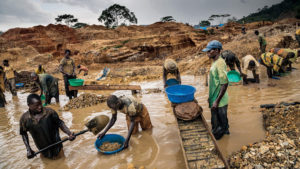Mauritania has vowed to ramp up its fight against slavery, becoming the second African country to approve a United Nations treaty designed to give countries the legal muscle to combat forced labor and trafficking.
Slavery is a historical practice in Mauritania and both adults and their children are the property of their masters.
The Haratin, who make up the main “slave caste,” are descended from Black African ethnic groups along the Senegal river. They often work as cattle herders and domestic servants.
The West African country has the highest prevalence of slavery, according to the Global Slavery Index, which estimates that 4 percent of the population — or some 150,000 people — are living as slaves.
The International Labor Organization said on Monday that Mauritania was the fourth country to sign up to the protocol, which includes measures to prevent modern forms of slavery as well as compensate victims.
An estimated 21 million people are in forced labor worldwide, generating about $150 billion a year in illicit profits, according to the ILO. Many are enslaved in brothels, farms, fisheries, factories, construction and domestic service.
The ILO is aiming to persuade at least 50 countries to sign up to the protocol by 2018. The three other countries which have already done so are Norway, Niger and Britain.
Mauritania criminalized slavery in 2007, but a new law passed last year makes the offense a crime against humanity and doubles the prison term for offenders to 20 years.
However, campaigners say complaints are not properly investigated and that anti-slavery campaigners have been arrested and jailed.
The U.S. State Department’s annual trafficking report says as well as age-old forms of slavery in Mauritania, girls are also trafficked for sex to the Middle East.
Countries ratifying the U.N. protocol, which modernizes a forced labor convention from 1930, will have to change laws to improve victim protection, compensation and access to justice.
The ILO’s Africa director, Aeneas Chapinga Chuma, said Mauritania’s ratification was “a first concrete step in putting in place the legal framework to protect people from the scourge of human exploitation and forced labor.”
Source: www.allafrica.com



